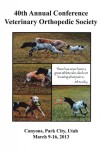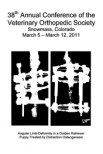Reasons for performing study: The influence of synovial fluid culture on short- and long-term prognosis of cases with septic synovitis requires study.
Hypotheses: Horses with a positive bacterial culture from septic synovial fluid are less likely to survive or return to successful athletic function than those with a negative bacterial culture from septic synovial fluid.
Methods: Records of mature horses presented to 2 equine referral hospitals for investigation of suspected septic synovitis were examined. Horses (n = 206) were included in the study if synovial fluid was submitted for full laboratory examination, including bacterial culture. A diagnosis of septic synovitis was based on a nucleated cell count >30 × 109 cells/l or >90% neutrophils and other clinical, cytological and bacteriological parameters. Long-term follow-up was obtained by telephone questionnaire. Univariate analysis, using the Fisher's exact test, was used for all outcomes.
Results: Fourteen (20.9%) of 67 horses with a positive bacterial culture from synovial fluid were subjected to euthanasia because of persistent synovial sepsis compared to 2 (1.44%) of 139 with negative bacterial cultures (P<0.001). Overall survival and successful long-term return to function in horses with a positive bacterial culture was 50% (24/48 horses) compared to 70.5% (74/105) in culture negative horses (P = 0.01). In horses that survived to be discharged, successful long-term return to function was not significantly different between culture positive and culture negative groups. Growth of Staphylococcus aureus from synovial fluid did not affect short-term survival to discharge from the hospital compared to other positive bacterial culture; however, successful long-term return to function was only 30.4% (4/13) in horses from which S. aureus was cultured compared to 73.9% (17/23) of horses in which other bacteria were cultured (P = 0.015).
Conclusions and potential clinical relevance: Horses with a positive bacterial culture from a septic synovitis have a poorer prognosis for survival to discharge from hospital and overall long-term return to function than horses that yielded no bacterial growth. When S. aureus was cultured, the long-term prognosis was poorer.









